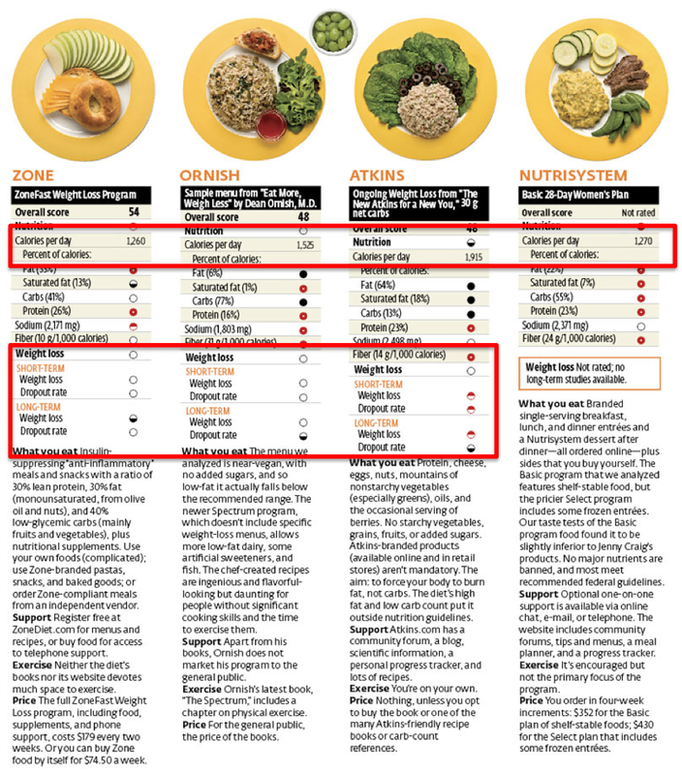According to traditional logic, if you want to lose weight, there must be a calorie deficit. In other words, you should find out how many calories your body uses each day, then eat 500 calories less each day and you will lose 1 pound per week. According to PhotoCalorie.com (which employs the widely used mifflin-St Jeor basal metabolic rate equations), for a 5'3" 160 pound woman to lose one pound per week she should eat about 1,480 calories a day. If this person went on the Atkins diet summarized in Consumer Reports, they would be predicted to GAIN a pound each week! And those consuming the Zone diet would be predicted to lose the most weight since they allow the least calories per day.
Yet this doesn't seem to be the case. In this review of diets and the scientific literature supporting them, calories don't predict weight loss.
This seems to be an unspoken consistent finding in the scientific literature. I have summarized this exact topic, with a link to all the recent studies in the Related Science section.
If calories don't predict weight loss, then what else could?
To try to explain these findings, or any other weight loss questions, as Gary Taubes points out, we should figure out three things:
- What does "getting fat" mean?
- What regulates our fat cells?
- Is there anything we eat that modifies or enhances the effects of these regulators?
This is uncontroversial. Any biochemistry textbook can explain this in depth. The million dollar, controversial question then becomes: If insulin causes us to store fat in our fat cells, then does anything we eat cause insulin to spike?
Without a doubt, sugar or refined carbohydrates tend to spike insulin the most. Carbohydrates in general spike insulin levels. Protein does too, but too a lesser degree, and fat has hardly any effect. So assuming this theory is true, then a net reduction in sugar and carbohydrates in your diet should result in more weight loss secondary to how many calories you are eating. It is also possible those consuming the Atkins diet are also more satiated and spontaneously eat less, despite the lenient calorie allowance in their diet.
This does seem to be true in the report above, since the Atkins group offers the most calories and the least carbohydrates. This also is suggested in dietary clinical trials, in which the various diets report eating the same amount of calories, yet the Atkins group seems to lose the most weight.
The next counter argument tends to be that a diet so high in saturated fats is bad for your heart. Here is how Consumer Reports explains this concept:
"Isn't it dangerous to eat so much fat? That's still a subject of vigorous scientific debate, but it's clear that fat is not the all-round villain we've been taught it is. Several epidemiology studies have found that saturated fat doesn't seem to increase people's risk of cardiovascular disease or stroke. Other studies suggest that you might be even better off if you replace saturated fat with unsaturated fat instead of with certain carbs, the ones that turn to blood sugar quickly after you eat them, such as white bread and potatoes.
A nutrition researcher, Frank B. Hu, M.D., of the Harvard School of Public Health, recently wrote that he believes "refined carbohydrates are likely to cause even greater metabolic damage than saturated fat in a predominantly sedentary and overweight population." Moreover, clinical studies have found that an Atkins or Atkins-like diet not only doesn't increase heart-disease risk factors but also actually reduces them as much as or more than low-fat, higher-carb diets that produce equivalent weight loss."
There does not seem to be any strong evidence that saturated fats cause heart disease. You can read more about this here and here.
---
Tried a paleo or carb restricted diet? Join the registry today and contribute to a better understanding of this way of eating.

 RSS Feed
RSS Feed
